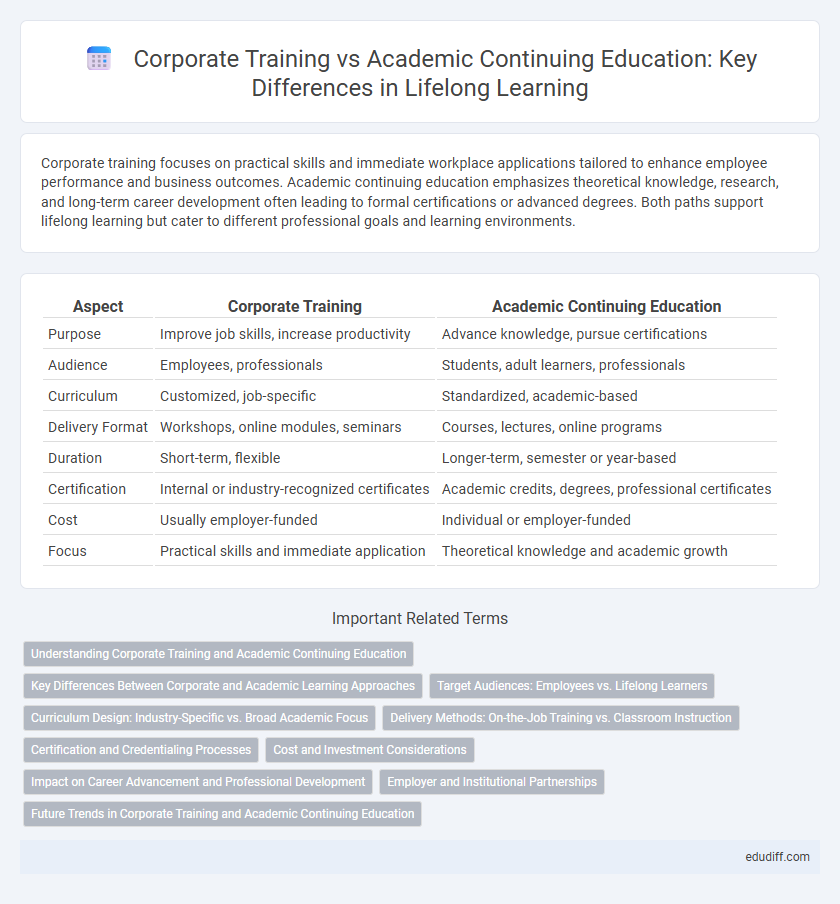Corporate training focuses on practical skills and immediate workplace applications tailored to enhance employee performance and business outcomes. Academic continuing education emphasizes theoretical knowledge, research, and long-term career development often leading to formal certifications or advanced degrees. Both paths support lifelong learning but cater to different professional goals and learning environments.
Table of Comparison
| Aspect | Corporate Training | Academic Continuing Education |
|---|---|---|
| Purpose | Improve job skills, increase productivity | Advance knowledge, pursue certifications |
| Audience | Employees, professionals | Students, adult learners, professionals |
| Curriculum | Customized, job-specific | Standardized, academic-based |
| Delivery Format | Workshops, online modules, seminars | Courses, lectures, online programs |
| Duration | Short-term, flexible | Longer-term, semester or year-based |
| Certification | Internal or industry-recognized certificates | Academic credits, degrees, professional certificates |
| Cost | Usually employer-funded | Individual or employer-funded |
| Focus | Practical skills and immediate application | Theoretical knowledge and academic growth |
Understanding Corporate Training and Academic Continuing Education
Corporate training focuses on enhancing employees' job-specific skills through practical, goal-oriented programs designed by businesses to improve workforce performance and productivity. Academic continuing education offers broader knowledge, often delivered by universities or educational institutions, emphasizing theory and professional credentials that support long-term career development. Understanding the distinct objectives and structures of these programs helps organizations and individuals choose the most effective learning paths aligned with immediate workplace needs or academic advancement.
Key Differences Between Corporate and Academic Learning Approaches
Corporate training emphasizes practical skills development aligned with specific business goals and immediate workplace application, leveraging short, targeted sessions and real-time feedback. Academic continuing education focuses on theoretical knowledge expansion, critical thinking, and long-term intellectual growth, typically delivered through structured coursework and assessments. Learning methodologies in corporate settings prioritize experiential, performance-based strategies, while academic environments emphasize research, analysis, and comprehensive subject mastery.
Target Audiences: Employees vs. Lifelong Learners
Corporate training primarily targets employees aiming to enhance job-specific skills and improve productivity within a company. Academic continuing education focuses on lifelong learners seeking personal growth, career advancement, or academic credentials outside traditional degree programs. Tailoring content to these distinct audiences ensures relevant and effective learning experiences aligned with their professional and personal development goals.
Curriculum Design: Industry-Specific vs. Broad Academic Focus
Corporate training curriculum design prioritizes industry-specific skills and practical applications tailored to meet immediate business needs, enhancing employee performance and productivity. Academic continuing education offers a broad curriculum emphasizing theoretical foundations and interdisciplinary knowledge to foster long-term intellectual growth and adaptability. This distinction ensures corporate programs align closely with workplace demands, while academic courses support diverse career advancement and lifelong learning.
Delivery Methods: On-the-Job Training vs. Classroom Instruction
On-the-job training in corporate settings offers immersive, hands-on experience that directly applies to workplace tasks, enhancing immediate skill acquisition and productivity. Classroom instruction in academic continuing education provides structured learning environments with theoretical foundations, promoting deeper understanding and critical thinking. Both delivery methods complement each other by balancing practical application with conceptual knowledge development.
Certification and Credentialing Processes
Corporate training programs emphasize industry-recognized certifications that align with specific job roles and organizational needs, enabling employees to swiftly demonstrate practical skills and compliance. Academic continuing education often involves credentialing through accredited institutions, offering formal degrees or certificates that enhance theoretical knowledge and professional qualifications. The certification process in corporate training is typically faster and more specialized, while academic credentialing is broader, focusing on comprehensive education and long-term career development.
Cost and Investment Considerations
Corporate training typically demands higher upfront investment due to customized content development and industry-specific tools, while academic continuing education often offers more affordable, standardized course options with potential financial aid. Organizations must evaluate the return on investment (ROI) by analyzing training effectiveness metrics, employee skill advancement, and long-term workforce productivity improvements. Academic programs might be more cost-effective for individual learners seeking credentials, whereas corporate training aligns better with tailored strategic business goals and immediate operational needs.
Impact on Career Advancement and Professional Development
Corporate training directly aligns with specific industry skills and enhances immediate job performance, accelerating career advancement through targeted professional development. Academic continuing education offers broader theoretical knowledge and critical thinking skills that build long-term career foundations and support transitions into new fields or higher-level roles. Both approaches complement each other by addressing practical competencies and comprehensive understanding crucial for sustained professional growth.
Employer and Institutional Partnerships
Corporate training programs prioritize employer partnerships to tailor skill development directly aligned with industry demands, ensuring workforce readiness and immediate applicability. Academic continuing education emphasizes institutional collaborations that foster research opportunities, broad knowledge expansion, and credentials recognized across diverse sectors. Both models leverage strategic partnerships, but corporate training focuses on practical, job-specific competencies while academic programs aim for comprehensive educational growth.
Future Trends in Corporate Training and Academic Continuing Education
Future trends in corporate training emphasize personalized learning experiences, leveraging AI-powered platforms and immersive technologies like virtual and augmented reality to enhance employee engagement and skill acquisition. Academic continuing education is increasingly integrating adaptive learning systems and micro-credentialing to meet the demands of lifelong learners seeking flexible, industry-relevant qualifications. Both sectors will witness a convergence toward hybrid models combining online and in-person formats, driven by data analytics to optimize learning outcomes and workforce readiness.
Corporate Training vs Academic Continuing Education Infographic

 edudiff.com
edudiff.com